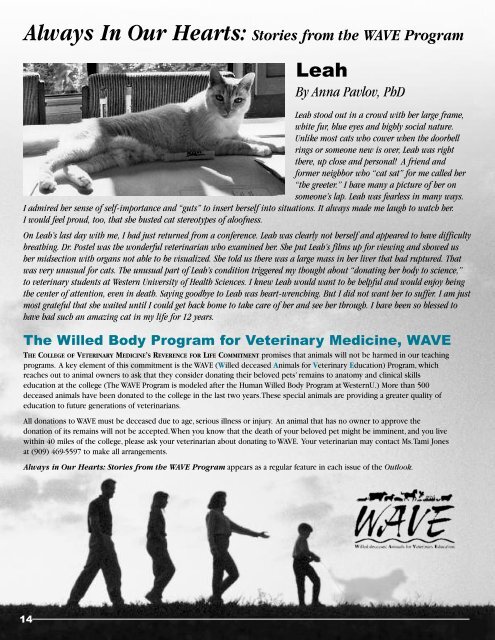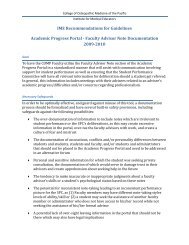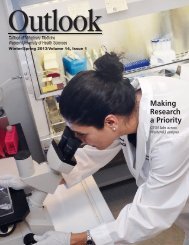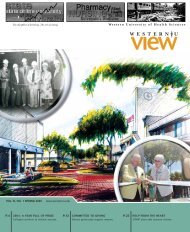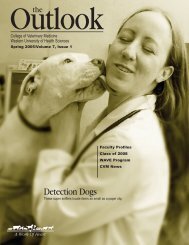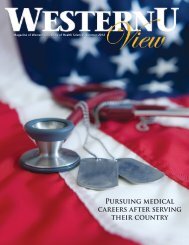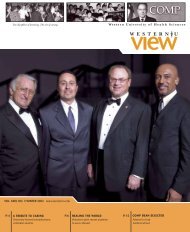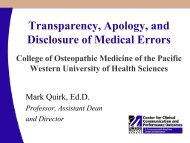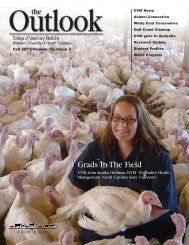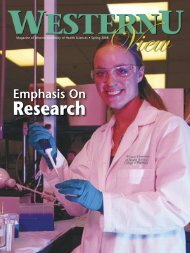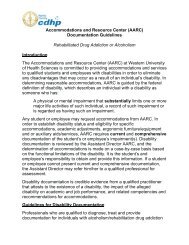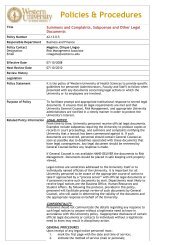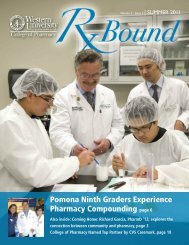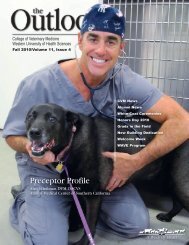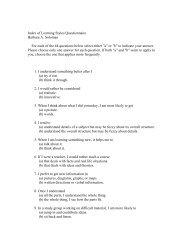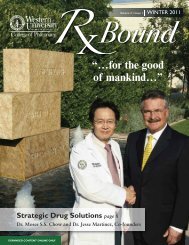College of Veterinary Medicine Western University of Health Sciences
College of Veterinary Medicine Western University of Health Sciences
College of Veterinary Medicine Western University of Health Sciences
You also want an ePaper? Increase the reach of your titles
YUMPU automatically turns print PDFs into web optimized ePapers that Google loves.
Always In Our Hearts: Stories from the WAVE Program<br />
Leah<br />
By Anna Pavlov, PhD<br />
Leah stood out in a crowd with her large frame,<br />
white fur, blue eyes and highly social nature.<br />
Unlike most cats who cower when the doorbell<br />
rings or someone new is over, Leah was right<br />
there, up close and personal! A friend and<br />
former neighbor who “cat sat” for me called her<br />
“the greeter.” I have many a picture <strong>of</strong> her on<br />
someone’s lap. Leah was fearless in many ways.<br />
I admired her sense <strong>of</strong> self-importance and “guts” to insert herself into situations. It always made me laugh to watch her.<br />
I would feel proud, too, that she busted cat stereotypes <strong>of</strong> alo<strong>of</strong>ness.<br />
On Leah’s last day with me, I had just returned from a conference. Leah was clearly not herself and appeared to have difficulty<br />
breathing. Dr. Postel was the wonderful veterinarian who examined her. She put Leah’s films up for viewing and showed us<br />
her midsection with organs not able to be visualized. She told us there was a large mass in her liver that had ruptured. That<br />
was very unusual for cats. The unusual part <strong>of</strong> Leah’s condition triggered my thought about “donating her body to science,”<br />
to veterinary students at <strong>Western</strong> <strong>University</strong> <strong>of</strong> <strong>Health</strong> <strong>Sciences</strong>. I knew Leah would want to be helpful and would enjoy being<br />
the center <strong>of</strong> attention, even in death. Saying goodbye to Leah was heart-wrenching. But I did not want her to suffer. I am just<br />
most grateful that she waited until I could get back home to take care <strong>of</strong> her and see her through. I have been so blessed to<br />
have had such an amazing cat in my life for 12 years.<br />
The Willed Body Program for <strong>Veterinary</strong> <strong>Medicine</strong>, WAVE<br />
THE COLLEGE OF VETERINARY MEDICINE’S REVERENCE FOR LIFE COMMITMENT promises that animals will not be harmed in our teaching<br />
programs. A key element <strong>of</strong> this commitment is the WAVE (Willed deceased Animals for <strong>Veterinary</strong> Education) Program, which<br />
reaches out to animal owners to ask that they consider donating their beloved pets’ remains to anatomy and clinical skills<br />
education at the college (The WAVE Program is modeled after the Human Willed Body Program at <strong>Western</strong>U.) More than 500<br />
deceased animals have been donated to the college in the last two years.These special animals are providing a greater quality <strong>of</strong><br />
education to future generations <strong>of</strong> veterinarians.<br />
All donations to WAVE must be deceased due to age, serious illness or injury. An animal that has no owner to approve the<br />
donation <strong>of</strong> its remains will not be accepted.When you know that the death <strong>of</strong> your beloved pet might be imminent, and you live<br />
within 40 miles <strong>of</strong> the college, please ask your veterinarian about donating to WAVE. Your veterinarian may contact Ms.Tami Jones<br />
at (909) 469-5597 to make all arrangements.<br />
Always in Our Hearts: Stories from the WAVE Program appears as a regular feature in each issue <strong>of</strong> the Outlook.<br />
14


